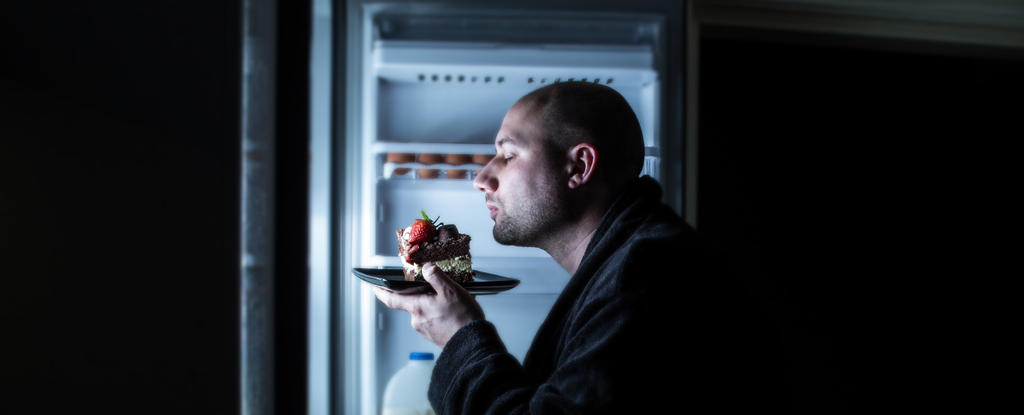A study suggests eating later in the day can directly impact our biological weight regulation in three key ways: through the number of calories that we burn; our hunger levels; and the way our bodies store fat.
With obesity now affecting hundreds of millions of people worldwide, this is a valuable insight into how the risk of becoming obese could be lowered in a relatively simple way – just by eating our meals a few hours earlier.
Earlier studies had already identified a link between the timing of meals and weight gain, but here the researchers wanted to look at that link more closely, as well as teasing out the biological reasons behind it.
“We wanted to test the mechanisms that may explain why late eating increases obesity risk,” said neuroscientist Frank Scheer, from Brigham and Women’s Hospital in Boston in 2022 when the study was published.
“Studies show that mindlessly shame-eating cake while kneeling in front of the fridge at 2am makes you fat.”
What a goofy thumbnail lol
It’s weird how every time one of these studies comes out, there’s always a couple idiots screaming:
A calorie is a calorie, no matter what!
Not only doe they always remind me of the Horton Hears a Who, they never fucking learn anything.
They were told something in 6th grade science class and latched on.
Completely ignorant that there’d be a reason that children don’t get taught everything and usually only get broad specifics.
I think people who obsess over calorie in calorie out reasoning drastically underestimate how variable the calorie out side can be with factors that aren’t exercise. Digestion isn’t 100% efficient, some calories are excreted. Small changes in body temperature have large changes in total energy consumption. Sleep quality, time awake, base heart rate and respiration rate, etc. all vary and have impacts on energy usage.
Parroting CICO sounds scientific because it borrows credibility from thermodynamics, but people aren’t closed systems and applying laws of thermodynamics takes a lot of nuance in complex systems with a variety of inputs and outputs.
Are they wrong? I don’t understand. A calorie is a calorie; it doesn’t change energy composition. The calorie is just a measurement of energy content in a given product. If it’s 15, it’s 15. The energy content doesn’t change just because you eat it at 2 am. Your body processes the calories differently, not the calorie itself is diffrent. Am I misunderstanding the study?
You’re misunderstanding is you think the basal metobalism while asleep is the same as awake…
I’m sure there’s lots of other things, but that’s what really giving you trouble right now.
It’s an incredibly basic part of biology
Why does that matter? If I burn 2000 calories a day, why does it matter if I burn them at a lower rate while asleep? I’m still going to burn more later, no?
Because you use less calories while you sleep, so excess calories are converted to fat…
And it’s harder to burn calories of fat than use calories directly.
So eating late in the day leads to new fat forming. If you ate the same earlier, it would be used immediately for fuel
This is all incredibly basic stuff…
And it’s harder to burn calories of fat than use calories directly.
What’s that supposed to mean exactly?
Your body loves fat.
It wants as much as possible.
To burn fat, you have to first use everything in your stomach, and then push through “the wall” where you keep exercising after your body says you need to quit.
Then your body will start the process to burn and use fat for energy.
So if you eat a lot at night and convert it to fat as you sleep. It’s going to be harder to work off that fat than if you had ate earlier in the day.
This article mentions that one of the factors is that late at night you have fewer hormones suppressing appetite so you would potentially eat more. That makes sense as a reason you would gain weight. It does say that you burn fewer calories at that time too (which might mean you convert more of it to fat at that time, and if you don’t burn those excess calories later you’re going to be stuck with it…)
But I don’t understand what you’re saying. It almost certainly takes more energy to convert calories to fat and then back to usable energy for your body to use… So what? If you eat 2000 calories, turn some of it into fat, and then burn 2000 additional calories later (in addition to the energy spent converting it to fat) you’re technically going to be burning more calories than you’re eating and you will lose weight.
I’m sure there is an effect of when you eat and how that makes you store fat and how that can unintentionally cause you to consume more calories than you think… but what you’re saying doesn’t make sense to me thermodynamically.
It almost certainly takes more energy to convert calories to fat and then back to usable energy for your body to use… So what?
Because you think a human body wants to be “healthy” …
It doesn’t, it wants to pack on all the fat it can to survive periods where food isn’t plentiful.
We didn’t evolve for unlimited cheap calories, our bodies still act like we’re living in caves.
Seriously, this is all very very basic stuff, you’ll learn a lot more reading about this then asking questions on social media and hoping you not only get the right answer, but explained in a way that makes sense.
but what you’re saying doesn’t make sense to me thermodynamically
BECAUSE THIS IS A HELL OF A LOT MORE COMPLICATED THAN CICO
Something I’ve been unable to explain in a way you can understand.
I doubt bolded all caps will help, but that’s literally my last hailmary.
Go read some actual scientific texts if you want to learn more.
My point is just that if you’re expending as much energy as you consume you wouldn’t be able to pack on fat forever. That just doesn’t make sense because fat can be converted into energy, but you’re using energy up. I’m sure that the time that you eat can have an impact on 1) how much you eat, 2) whether and maybe where your body stores energy as fat, and 3) your metabolic rate which impacts how many calories you burn, and 4) maybe if you store energy as fat it’s harder to access and you wouldn’t feel as energetic or eager to burn it mentally, because as you say we’re kind of hard wired to want to be fat in case of famine. I’m not disputing any of that… But I don’t understand how eating after midnight would let you store more energy than you consume in the long term. If you actually eat 2000 calories and actually burn 2000 calories, where does the extra fat come from? I’m sure you can maybe trick your body into having a higher body fat percentage or something, but the calories and carbon atoms have to come from somewhere, no?
To be very clear, I’m not saying it’s easy to lose weight. It’s very hard for a lot of reasons: calorie counts are inaccurate, and knowing how many calories you’ve burned is extremely difficult, and all the while your body is going to fight you because it “wants” to be prepared to have no food (mentally you won’t want to do it, and my understanding is that your metabolism can slow down as well making it even harder to burn off extra calories)… But at the end of the day, if you actually intake 2000 calories and actually burn 2000 calories, I do not understand how you would be able to build up more fat. You would necessarily have breathed out all of the carbon you would need to build the extra fat molecules. Saying it’s “just calories in and calories out” is dismissive of how hard it is to lose weight and all of the factors that make it extra hard, but I do not see how you can gain fat if you actually manage to pull it off?
lol, what? No, do you misunderstand me on purpose?
- I said a calorie is a calorie, no matter when you eat it; it does not change its energy content; because you said a calorie is not a calorie.
- I said you process it differently depending on your body, which is basically what you’re trying to say with the metabolism change.
To make it clear what I meant before: my point is the calorie is never the changing part in the equation; it just is what it is—a calorie measurement (a calorie is a calorie). But the other part of the equation, your body, is ever-changing depending on a lot of factors like the time of the day, health, etc.
The simple calorie intake to burnt calories ratio is still a valid stat since energy is a constant.
It’s an incredibly basic part of physics. ;)
(Why are you so condescending? It’s weird how you acknowledge my points and seem to mean the same thing, but at the same time, you think I am wrong and do not understand it.)
I really don’t understand what’s going on in this thread. Like… We know how sugars and fats are turned into energy that your body can use. It’s not the full story, but as an example, look at the formula for aerobic respiration, which reacts glucose (C6H12O6) and oxygen (O2) to produce carbon dioxide (CO2), water (H2O), and energy…
C6H12O6 + 6 O2 —> 6 CO2 + 6 H2O + energy
At the start you only have 6 carbon atoms (all in the glucose) and at the end they all end up in CO2 molecules, which you will exhale. Fats are organic molecules made up primarily of carbons and hydrogens… If you consume 2000 calories worth of glucose and burn it all, you have no carbons left to make additional fat. Burning fat is more complicated than glucose, but the ultimate result is the same… The carbons get bound into CO2 and you exhale them. You cannot make fat from nothing, if you get rid of more carbons than you consume you’re eventually going to “lose weight” (or maybe “lose fat” would be more accurate… eventually you’ll have to use the carbons in your fats to make the CO2 that you exhale. You could still potentially gain weight if you had more water in your body, though).
I think what people are trying to get at is that telling people to count calories and that “calories in < calories out” isn’t always helpful advice for people who want to lose weight. That’s very fair. There’s a number of factors that make it incredibly hard to lose weight. I think a huge problem with “calories in < calories out” is just that “calories” aren’t as meaningful as you’d hope in every day life. It’s very hard to know exactly how many calories you actually absorb when you eat different kinds of foods, and how many calories you absorb may depend on other factors like the time of day, what other stuff you’ve eaten, etc… And it’s also pretty much impossible for somebody to know how many calories they actually burn during a day (you don’t know what your base metabolic rate is, and fitness trackers are notoriously inaccurate). If you’re trying to have a 100 calorie deficit per day or something, you don’t actually have a lot of margin for error. That plus all of the discomfort and misery associated with losing weight makes it a difficult task, so I totally agree that it’s insensitive to tell somebody to “just do calories in < calories out” when dieting… But physically speaking that is what’s happening in every case when somebody loses fat through diet and/or exercise.
Oh, I get your point, and it makes sense. Thank you for elaborating, sir!
I do not question the study or its content or you; I question the statement the gentleman made before that a “calorie is not a calorie, and that’s what people don’t get”.
My point/my opinion was that saying “a calorie is not a calorie and that’s what people don’t understand” is wrong.
In my opinion, a calorie is always a calorie. A food does not change its calorie value based on when you eat it. What people don’t understand is how their body “uses” these calories. But this does not change the calorie content of the food; it just changes how you absorb them. It’s not that people don’t understand calories; it’s that they don’t understand the reaction that happens when the “calories” are ingested.
A pancake will always have x amount of calories, no matter if you eat it now, throw it away, or eat it at midnight or as breakfast; it will be x amount of calories. But depending on your body and in which state it is, it will absorb not all or it will absorb differently. The pancake and its calorie contents exist outside of your body and how you absorb/use them; it’s not the “changing part” of the equation.
Here is how I define a calorie, which is a fixed value:
-
A unit of energy equivalent to the heat energy needed to raise the temperature of 1 gram of water by 1 °C (now often defined as equal to 4.1868 joules).
-
A unit of energy, often used to express the nutritional value of foods, equivalent to the heat energy needed to raise the temperature of 1 kilogram of water by 1 °C, and equal to one thousand small calories; a kilocalorie.
If you want to claim that a calorie is not a calorie, I say word it differently since this is not true. A calorie is just a fixed value. You mean people don’t understand what happens after ingesting.
My point was never that calorie counting is all you need; my point was dismissing it outright is wrong, since it still tells a story, not the whole story, but certainly a part of it.
Does this make sense?
TLDR: I agree with the sentiment that a calorie is not just a calorie and understand what is meant by that. However, my issue is that it is a bit misspoken since calories are determined before you ingest/digest/absorb/pass them through. It is an expression of the energy content of a food/object, not of what you effectively get out of it when you eat it. My whole point is not to disagree with the sentiment but how it is communicated. Maybe people just don’t generally know what a calorie actually means or how it relates to our metabolism.
Yeah, we’re actually both in complete agreement. I’m just getting shit in this thread too for saying a calorie is a calorie too :P. So, I feel like I’m going insane because of this dude who’s super mad and all of the downvotes for what seem like completely reasonable statements to me, and nobody is actually explaining where I’m wrong… I think weight loss is just a pretty emotionally charged topic.
In some sense I think there are two meanings of calorie to people. There’s the actual physical energy definition, and there’s the slightly more informal usage of “how much food I consumed” and while ultimately they’re both supposed to be measures of the same thing they’re not really the same because like… I dunno, if you chug a gallon of mineral oil or something and all of your food goes through you undigested (I don’t know if that would work, but it feels like it would haha), you’re not actually going to absorb those calories. This shouldn’t make a difference for what a calorie actually is, but I guess it changes what it means in practice for people? Like if a pancake and a pineapple have the same amount of calories when you burn them in a bomb calorimeter, but you only absorb 80% of the pineapple’s calories as opposed to 100% of the pancakes due to indigestible fibre or whatever, that calorie measurement isn’t actually useful to people. But fundamentally, in the physics sense of everything, if you burn a calorie you actually absorb… it’s gone and you don’t have anything left to store as fat to gain weight. What time you consume calories won’t change this (maybe it changes your metabolism or something and you ultimately burn fewer calories, but if you actually burn all of the calories you actually absorb… I don’t understand how you could gain fat. The carbon is gone).
Haha, same - yes, I think you are right - I think we come from the perspective that a calorie is what the definition says it is, which is an energy unit. And this makes the saying “a calorie is not a calorie” sound wrong. Yeah, seems like it’s an emotional trigger for some, which is understandable.
I don’t get why this is such a problem to point out that maybe they themselves use the word calorie in a different context than it was actually intended to be used. And this does not help the confusion surrounding the topic.
The problem, I think, is that a calorie is used to describe the energy content of something and not for anything else. It is useful for food since the inherent value of energy that we need to transform every day to survive can also be expressed in calories (and so can be almost anything), which makes it easy to eyeball how much energy we can “absorb/transform” from a given product. But this does not describe how healthy or nutritious or anything else the product is or how your body is going to deal with it; it just describes the energy content of the thing.
A calorie is a measurement of energy and nothing else.
And I am sure you are right; at the end of the day, you can boil it down to one number that’s either negative, 0, or positive, i.e., your calorie deficit. If it’s negative, you used more energy than you took in, so you will need to take that energy from somewhere, which will result in some form of burning of fat or other tissues to transform the stored energy into something we can use actively, which then means you will lose weight over time. Energy can’t be created, at least not to my limited knowledge, only transformed. Of course, given that your body works within the normal human norms.
Anyway, thanks for the nice interaction. 😄
I wish you all the best this year! Have a great life!
-
Well, I could try explaining it again so that in a couple days you reply again still upset at me that you cant understand it…
Or I could just block you, then Ill completely forget you exist and never have to try and explain stuff again …
Let me think about that
lol, what? Sorry, your highness. I’ll never doubt you again 😂 who hurt you?
The problem with the world is that the intelligent people are full of doubts, while the stupid ones are full of confidence.
Whatever you learn in Mrs. Gerwilikers 4th grade science class is ALL THERE IS TO SCIENCE. No more.
What you are saying is equivalent to saying one kilometre is longer or shorter, depending on what time of day you walk it .
Or maybe they’re saying that walking that kilometer can be easier or harder, depending on whether you’re going uphill or down, and whether there is snow upon the ground
The kilometre doesn’t give a fuck.
No, it doesnt, but walking to school is more than just distance. The effort and time required, the likelihood of success, are affected by other things as well.
Anecdotal, but I do intermittent fasting. I typically stop eating around 6pm, sometimes earlier. I lost 10lbs less than 3 months after I started without changing what I eat, just when I eat. Before that, I used to keep snacking until midnight before I went to bed.
Glad fasting is working for you! Are you confident that you are eating the same number of calories as you were before (even if you are eating the same kinds of foods)?
Do you get all those snacks you used to eat until midnight in before 6:00pm, or do you just eat until full?
I honestly don’t count calories (which is why IF was perfect for me), but I’m likely eating less because I’m essentially skipping one meal a day (I do 16:8). When I started, I actually kept getting all those snacks in and ate a lot on my last meal because I was always worried about going hungry. I still lost weight anyway. Nowadays, I pace myself a little better (there’s only so much you can eat in 8 hours) and no longer need to stuff myself at 6pm.
I’ve been doing IF for 7 years. Works great for me.
Would love to see more of these studies look at shift work. I work rotating shifts and shift my eating schedule all the time to coincide with work.
Shift work (my phone autocorrected to “shit work”, apropos) is just straight bad all around:
I don’t wanna floss and brush my teeth after already eating dinner so that’s a big factor sometimes.
Hmmm ……a study of 16 obese people in a controlled environment. I am not persuaded.
Most of the scientific community understand this to be a myth :
A calorie is a calorie, no matter what time it is consumed .
Your linked study handout doesn’t support your claim that “a calorie is a calorie, no matter what time it is consumed.” Care to provide something that illustrates most of the scientific community is behind this?
I am especially curious about the study, called out in your handout, that showed night eating led to weight gain for a specific population. That would seem to suggest there’s more at play than just caloric value, no?
The citations are at the bottom.
I read the citations. They don’t support your argument. That’s why I commented.
How did you interpret this bit :
CONCLUSION: Night eating was not associated with later weight gain, except among already obese women, suggesting that getting up at night to eat may be a contributor to further weight gain among the obese
I am especially curious about the study, called out in your handout, that showed night eating led to weight gain for a specific population. That would seem to suggest there’s more at play than just caloric value, no?
deleted by creator
IDK, AFAIK that’s not exactly true. E.g. our gut bacteria play a big role in our health, including digestion. Gut bacteria are living organisms themselves and consume food we eat while it’s still in our stomachs. I’ve read that different kinds of foods, depending how easy it is for the bacteria to consume, may introduce more or less calories to us since the bacteria might digest some things before it gets past our stomach.
From what I’ve read, this is already influenced by the state of food, like how much it’s been processed, but maybe it’s based on time too. If the bacteria already ate an hour or two ago then maybe they wouldn’t absorb as much when you have a snack later.
Or maybe, when the bacteria have just eaten, they have also just divided and can digest twice as much.
I don’t think we can simply say for certain that a calorie is a calorie no matter when its consumed.
Although evidence is still limited, there are indicators that eating earlier in the day leads to less weightgain.
My blatantly unscientific quick rationale: if you’re catching your prey late in the day, it was a tough hunt or food might be scarce, better hang on to those calories tightly.
In a slightly more scientific angle, I wonder if it could have to do with changes in digestion processes when sleeping.
I read about this a while ago so my memory is fuzzy on the details; I think the circadian rhythm was a key factor in this.





